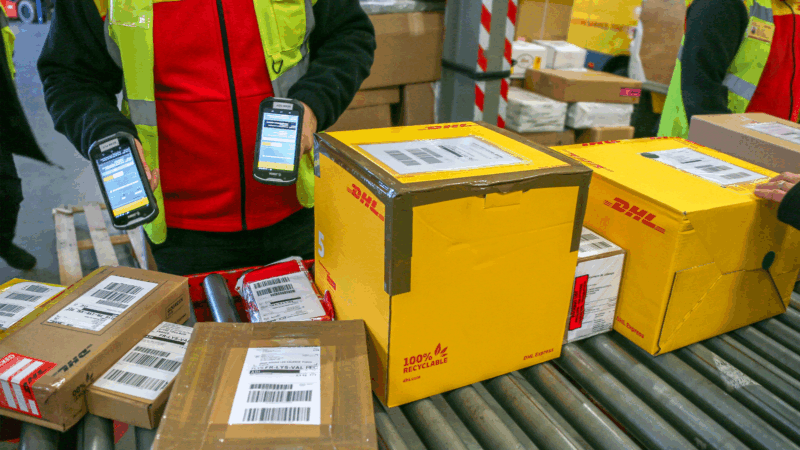Boxed in by shifting tariff rules, European shippers pause some U.S.-bound parcels
Many European parcel companies — including DHL, the Royal Mail, and the French and Spanish national post offices — are temporarily suspending some shipments to the U.S., citing new U.S. tariff policies that kick in this week.
And while the financial costs of tariffs have dominated trade news this summer, in this case, it’s not so much the money as the paperwork that’s a stumbling block.
An executive order from President Trump will end the “de minimis” rule, which allowed individual packages worth less than $800 to enter the U.S. duty-free, effective August 29. The “de minimis” rule (sometimes called a loophole) had already been eliminated for China and Hong Kong, but is now being suspended for all countries.
Letters are not affected by the new rules. Also, gifts worth less than $100 (and sent between individuals, not from a company) are exempt and can still be sent. But packages from businesses will be significantly affected. As NPR has previously reported, most packages shipped into the U.S. currently qualify for the “de minimis” exemption.
Removing the exemption raises costs for imported goods. But that’s not why post offices and parcel companies are pressing pause on some shipments — instead, they’re citing ambiguous policies and the need to establish brand-new logistics systems.
“Key questions remain unresolved,” writes DHL Group in a statement, “particularly regarding how and by whom customs duties will be collected in the future, what additional data will be required, and how the data transmission to the U.S. Customs and Border Protection will be carried out.
As a result, DHL Group says, it’s suspending business shipments to the U.S. through Deutsche Post and DHL Parcel Germany. The more expensive DHL Express service will remain an option.
DHL did not have an estimate of how long the pause would last, but said the goal “is to resume postal goods shipping to the U.S. as quickly as possible.”
The French postal service La Poste is also suspending shipments of goods to the U.S., telling France24 that European postal services were given “an extremely limited timeframe” to prepare for the new rules, and that the policies require “further clarification.” Spain’s Correos postal service is also suspending goods shipments for now, saying the new policies and their short timeframe for implementation are having a “significant impact” on international postal logistics.
The Royal Mail, meanwhile, predicted only a brief disruption of 1-2 days as it establishes new services that will calculate and invoice companies for the tariffs.
In a fact sheet published last month, the White House called “de minimis” treatment a “catastrophic loophole” and a “big scam,” arguing that it not only reduces tariff revenue but enables the importation of illicit drugs, because “de minimis” goods also get expedited processing, meaning less oversight of the goods coming in.
There’s bipartisan support for restricting or eliminating “de minimis” shipments. The Biden administration, too, had raised concerns about drugs and unsafe products slipping into the country. Some U.S. companies have also argued that it gives an unfair advantage to foreign manufacturers over American companies by allowing an easy way to bypass tariffs.
The duty-free shipments do have some defenders. The Cato Institute, a libertarian think tank, has argued that eliminating de minimis shipments would hurt poorer Americans the most and — presaging the headaches that logistics companies are encountering this week — would be “an administrative nightmare.”
US military used laser to take down Border Protection drone, lawmakers say
The U.S. military used a laser to shoot down a Customs and Border Protection drone, members of Congress said Thursday, and the Federal Aviation Administration responded by closing more airspace near El Paso, Texas.
Deadline looms as Anthropic rejects Pentagon demands it remove AI safeguards
The Defense Department has been feuding with Anthropic over military uses of its artificial intelligence tools. At stake are hundreds of millions of dollars in contracts and access to some of the most advanced AI on the planet.
Pakistan’s defense minister says that there is now ‘open war’ with Afghanistan after latest strikes
Pakistan's defense minister said that his country ran out of "patience" and considers that there is now an "open war" with Afghanistan, after both countries launched strikes following an Afghan cross-border attack.
Hillary Clinton calls House Oversight questioning ‘repetitive’ in 6 hour deposition
In more than seven hours behind closed doors, former Secretary of State Hillary Clinton answered questions from the House Oversight Committee as it investigates Jeffrey Epstein.
Chicagoans pay respects to Jesse Jackson as cross-country memorial services begin
Memorial services for the Rev. Jesse Jackson Sr. to honor his long civil rights legacy begin in Chicago. Events will also take place in Washington, D.C., and South Carolina, where he was born and began his activism.
In reversal, Warner Bros. jilts Netflix for Paramount
Warner Bros. says Paramount's sweetened bid to buy the whole company is "superior" to an $83 billion deal it struck with Netflix for just its streaming services, studios, and intellectual property.







